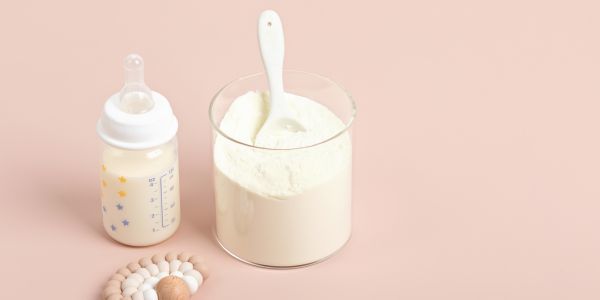

The WHO has warned that the ‘aggressive’ marketing of formula milk flouts their code on marketing formula.
The formula industry globally turns over around $55 billion a year, with 'misleading messages' that are being called 'unethical' by the WHO, who have called for plain packaging rules similar to those imposed upon tobacco.
A report issued by the WHO and Unicef advises that countries should take action against the “aggressive” and “unethical” marketing of formula milk for babies (stage one). Suggestions include requiring companies to sell formula in plain packaging, rather than in recognisable branded boxes. Research conducted by experts has found that the marketing of formula has 'no limits' and is actually becoming even more 'invasive' and 'unregulated' in the digital era, with social media being a popular source for the unregulated promotion of infant formula.
Dr Tedros Adhanom Ghebreyesus, WHO director general, said:
“It is clear that the marketing is unacceptably pervasive, misleading and aggressive. Regulations on exploitative marketing must be urgently adopted and enforced to protect children’s health.”
As previously mentioned, the report by the WHO and Unicef suggests using 'standardised' packaging for all formula across all brands, much like tobacco in the UK since the change in regulations in 2017. This is proving controversial amongst parents, with many being upset that feeding their baby is being compared to smoking.
Dr Nigel Rollins, a paediatrician in the WHO’s department of maternal, newborn, child and adolescent health, said:
“Nobody is equating formula milk with cigarettes. The commonalities are there. But instead of packaging being an opportunity for commercial marketing, it should be a place where public health can actually give accurate information to women. And if that type of information can be given clearly and honestly, then I think that’s a good thing.”
The report also contains input from Henrietta Fore, Unicef’s executive director until recently, who states that while formula milk “has its place for women and parents who are not able or do not want to breastfeed, babies’ best possible source of nutrition was their mother’s milk."

This message is particularly relevant to parents in developing countries.
It is worth bearing in mind that parents often do not have any or much access to clean water or consistent supplies of formula powder. This can, and has actually led to well-documented incidents of babies becoming very unwell due to unsafe formula preparation, and malnutrition due to mums being given samples of formula by companies, with no consistent long-term supply of formula established or safe preparation instructions given. This means that the code of practice in particular protects parents and babies who are at particular risk.
Dr Nigel Rollins went on to state that 'the long-term benefits of breastfeeding, to both mother and child, applied across the board'. The WHO advises that babies globally should ideally be exclusively breastfed for the first six months of life, and then given breastmilk alongside solids until they are at least two.
What is the WHO formula code and why was it created?
This is known as the International Code of Marketing of Breast-milk Substitutes. It was agreed upon in 1980, at the 33rd World Health Assembly, after global breastfeeding rates declined and the ethics of companies that manufacture substitutes came into question. Read about how this code is monitored and reflected in UK law here.
The code is a voluntary code of practice and is ultimately there to protect new parents and babies by regulating the marketing of breastmilk substitutes, bottles and teats, as well as setting standards for the labelling and quality of the products sold. Unicef state:
"Restricting marketing does not mean that the products cannot be sold, or that factual and scientific information about them cannot be made available. Nor does it restrict parents’ choice. It simply aims to make sure that their choices are made based on full and impartial information rather than misleading, inaccurate or biased marketing claims."

What research has been done?
The new research surveyed 8500 parents and pregnant women, as well as 300 health workers in eight countries. These countries include Britain, China, Nigeria and Bangladesh. The research comes about 41 years after the international code of marketing of breastmilk substitutes was passed.
The findings were damning, with it being concluded that the formula-milk industry is sending “misleading, scientifically unsubstantiated” messages and that many adverts actually violate the code. A very large number of health workers around the world have actually been approached by reps from the formula industry with the aim of influencing the recommendations given to new mums via;
- Promotional gifts
- Funding for research
- Paid meetings, events and conferences
- Commissions from sales
Another problematic finding was that manufacturers are using 'pain-point marketing'.
This was referred to as “exploitative” by the report. Pain-point marketing refers to adverts and promotions that claim to offer solutions to common infant maladies, like as colic, reflux and patchy sleep, often preventing parents from actually seeking medical support as a first option. Dr Nigel Rollins stated that this marketing is influencing the choices of parents based on 'wrong information' and went on to say:
“Decisions on something as fundamental and as influential as infant feeding should be primarily based on the most accurate and truthful information and not information that is somehow linked with commercial interests and commercial gain."
What does the report suggest?
The report actually makes no formal WHO recommendations for action but does suggest on how governments can act upon this information, with ideas such as;
- Tougher legislation on the promotion of formula.
- Better investment in breastfeeding support.
- Paid parental leave being improved.
- Plain formula boxes.
- Banning health workers from collaborating with formula representatives.
“Exploring the area of plain packaging is definitely an area that we’re looking at because it was an area brought up by the mothers surveyed. Mothers said they found the packaging confusing, not clear, and they were left uncertain what to do, or what to choose, because of the messages on the package.” Dr Rollins
Our verdict...
Fundamentally, we support all parents - it's your right to choose, and some mums really struggle to breastfeed, through medical circumstances or poor support. Access to formula is important! However, on the flipside, we appreciate the importance of the WHO code and are glad that their report contains suggestions on how governments can act - providing better breastfeeding support to new mums being one of those suggestions. We love and support you all no matter what, and think that either way, improving the regulation of information and adverts that new parents are exposed to can only do good.
Other articles to read...


.png)







